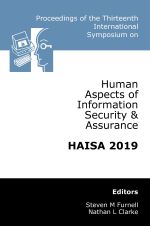In 2014, we launched our open-access repository which offers full text access to conference proceedings from many of our events including the INC and HAISA series. These papers are free to access and distribute (subject to citing the source).
» Openaccess proceedings » Thirteenth International Symposium on Human Aspects of Information Security & Assurance (HAISA 2019)
 | Thirteenth International Symposium on Human Aspects of Information Security & Assurance (HAISA 2019) |
Title: Aligning Cyber-Security Training to Individual Cognitive Style
Author(s): Malcolm Pattinson, Jane Sweeney, Marcus Butavicius, Andrew Reeves, Kathryn Parsons, Agata McCormac, Dragana Calic
Reference: pp132-142
Keywords: Group Embedded Figures Test (GEFT), Field Independent (FI), Field Dependent (FD), Cognitive Styles.
Abstract: This paper reports on the early stages of a project that investigates the concept of a framework of cyber-security controls (i.e. an Adaptive Control Framework (ACF)) that can be adapted or aligned to individual cognitive styles. The specific cyber-security control considered by this current research was employee cyber-security training, namely, email-use training to improve the detection of phishing-email attacks. Previous research suggests that an individual’s cognitive processing style can be classified as either Field Independent (FI) or Field Dependent (FD) and that this personal characteristic may warrant a specific mode of training. Accordingly, the overall aim of this research project is to establish whether computer-based phishing training is more effective when it matches individual cognitive processing style. Two computer-based phishing training modules were developed using Articulate Storyline 360 software. These two modules, an FI version and an FD version, were designed in accordance with principles derived from the literature in order to maximise training effectiveness. Future research is planned to include empirical tests for improved cyber-security behaviour and other concepts of adaptive cyber-security training.
Download count: 683
How to get this paper:


PDF copy of this paper is free to download. You may distribute this copy providing you cite this page as the source.
